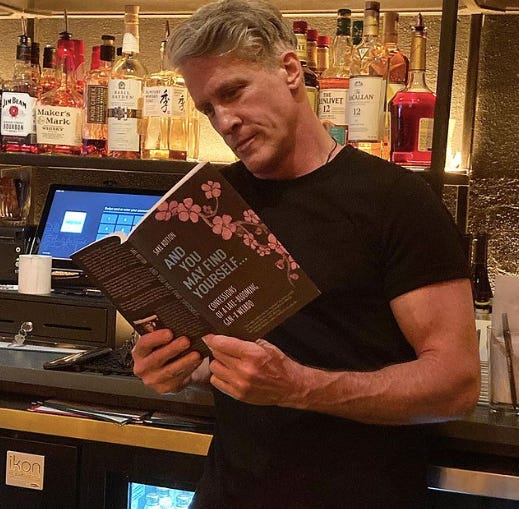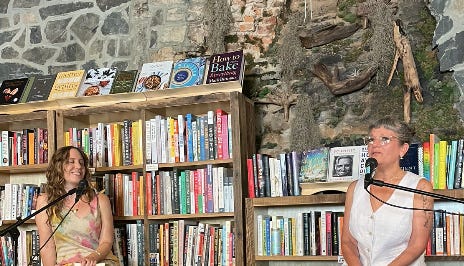
Last week an old friend of mine, a man in his late 50s, texted to tell me that he loved my book. “I thoroughly enjoyed your insights and perspectives, even though I’m not the target audience,” he added. He’d only picked up the book because it was a memoir by someone he knew, and he was curious about “some pieces of the Sari puzzle” he’d long wondered about.
Initially this exclusion made sense to me. On some level I anticipated that it would be mostly women who’d appreciate my book, although I didn’t write it with the intention of only appealing to my own gender. For the past few weeks I’ve been hearing from women about how much they relate to various pieces in the book, and also how much they’ve laughed in places—the laughter of recognition. It’s been incredibly satisfying and validating to learn that even some of the experiences I was most self-conscious about—felt weirdest about—are resonating with others, and that they can laugh along with me.
And it hasn’t only been Gen-X women, which has been great. I’m hearing from women both younger and older.
When I was in conversation with millennial author Chloe Caldwell at Rough Draft Bar & Books in Kingston last week, we talked about shared experiences—messed up reproductive systems, and being “divorce kids” who experienced what late psychologist and author Judith Wallerstein referred to as “the sleeper effect,” in which it becomes difficult to partner healthily in adulthood. We marveled at how much we have in common, despite being twenty years apart in age.
More recently, though, I’ve started to hear from some men who relate to what I wrote, and that has been validating and heartening in a different way. It’s informed me that my story and my existential concerns are more broadly human. It’s also telling me that there are men out there who aren’t afraid to read memoirs by women, men who want to learn about women’s experiences, who are curious about more perspectives than merely those of people just like them.
I also had very positive experiences being interviewed by two men, both of whom engaged with the book incredibly thoughtfully, and demonstrated that they really *got* it, and enjoyed it. The first was Joe C. Donahue, host of The Roundtable on WAMC Northeast Public Radio (an NPR affiliate); the second was Paul Zakrzewski, host of a podcast called The Book I Had to Write.
I called my old friend up and told him about this development. “You know how you said you’re not the target audience for my book?…” I began. Then I told him about the men responding positively to it, and also about “Gender Genre,” an essay Alexander Chee published in 2014 in the New York Times Book Review about the three years in college when he read books by women to the exclusion of all others, as something of a “cure.” Chee writes:
I inhabited a system in which any boy goes through life with a kind of automatic social promotion, able to take his turn first, answer first, eat first. His ideas are welcome, people smile at him, feed him, pay him well. When he is in trouble, he is usually helped first, or told there will be no consequences this time, and “this time” turns out to be every time…I was surrounded by men taught to speak over women and permitted to lash out aggressively after being challenged by women. Professors — even female professors — called on men first and privileged their ideas, even when they were bad ideas.
This aspect of Chee’s essay was especially relevant to my conversation, because after telling me how much he enjoyed and appreciated my book, my friend went on to defend a man I wrote about, who’d treated me horribly. He wasn’t saying that what the man in question did was right, or that I was wrong to be hurt and angry about it, or even write about it—especially given how much I blurred the character. But my friend took on the role of apologist, making excuses for the guy’s bad behavior, and calling on me to find compassion. This turn in the conversation depressed me. A long-standing problem is that I’d always showed so much more compassion for that man—and other men who treated me badly—than I’d shown for myself.
“This is why you very much are part of the target audience for my book,” I told my friend. “You need to have your perspective broadened.” I explained that the world was already overly sympathetic to men like that ex of mine, making it so he was able to get away with the things he did—that I’d let him get away with those things again and again, because I, too, was conditioned to privilege men over myself.
I stopped short of using the word “himpathy” because I didn’t know whether that would bring us to the place where my friend could no longer hear me. My friend told me I’d opened his mind. He still felt sorry for the ex, but he also had more of an understanding of what I’d been through, and had more compassion for me. He said that now he was especially glad he’d read the book.
Maybe my friend was humoring me—I’ll never know for sure—but I’d like to believe I made some kind of a dent in his prior limited thinking. Even if I didn’t, it felt good to say my piece and stand up for myself. And maybe the things I wrote will sink in for my friend even more, over time. One way or another, I’m glad he (and some other men) read it.
🌸🌸🌸
On another note, my book has been out for three weeks now, and things have been going really well. I’ve had great events, people are responding well to the book, I’m scheduling new events. On September 8th I’ll have a remote in-conversation with Megan Stielstra, via Oblong Books in Rhinebeck, over Zoom. I’m working on putting something together with Liz Prato and another thing with Amy Rigby.
But…I could use some help.
I’ve loved publishing with tiny Heliotrope Books, based in the East Village, my old stomping grounds. But being with a small press means it’s more difficult to get distribution and to get the word out. So…
If you haven’t already gotten the book, I hope you’ll consider getting it.
If you’ve gotten it and enjoyed it, please spread the word, via social media or however you do that kind of thing.
Maybe leave a review on Goodreads or Amazon.
Ask your local bookseller and/or library to carry it.
Maybe…give a copy to a man…? Think of it as part of a very necessary cure.
Thank you!





Love this.